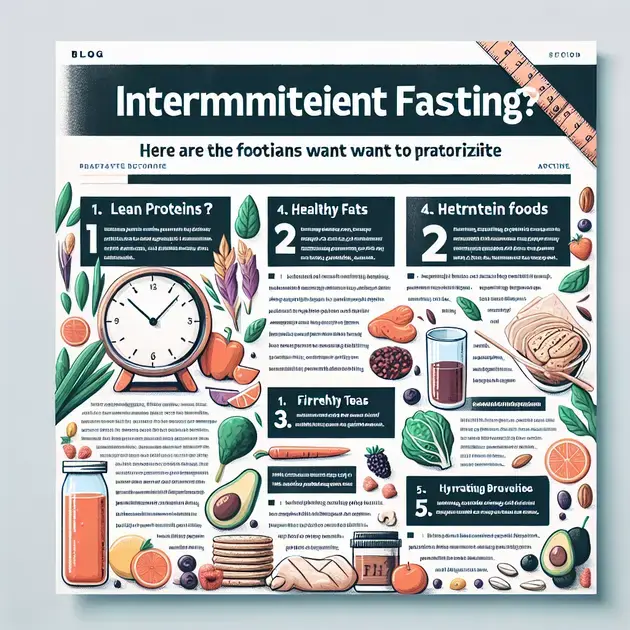
Intermittent Fasting: Prioritizing the Right Foods for Optimal Benefits
Intermittent fasting has gained popularity as an effective approach for weight loss and overall health improvement. This eating pattern involves cycling between periods of fasting and eating, with many different methods available. While it’s crucial to understand the specific guidelines and protocols of intermittent fasting, knowing what to eat during the eating windows is equally important to maximize the benefits of this lifestyle.
To ensure that your body stays energized and on track while fasting, it is essential to prioritize the right foods. These foods will not only provide you with sustained energy throughout the fasting period but also support your overall health goals.
1. Protein-rich Foods:
During the eating window, make sure to include plenty of protein-rich foods in your meals. Lean meats like chicken, turkey, and fish are excellent sources of high-quality protein. Vegetarians and vegans can opt for legumes, tofu, tempeh, and quinoa to meet their protein needs. Consuming adequate protein supports muscle growth and repair, appetite control, and overall satiety, helping you stay on track with your intermittent fasting goals.
2. Healthy Fats:
Incorporating healthy fats into your meals can be beneficial during intermittent fasting. Avocados, nuts, seeds, olive oil, and coconut oil are nutrient-dense sources of healthy fats. These fats provide essential fatty acids and contribute to feelings of fullness, reducing hunger pangs that may arise during fasting periods. Additionally, healthy fats support brain health and overall well-being.
3. Fiber-rich Foods:
Including fiber-rich foods in your diet is vital for maintaining optimal digestive health and promoting feelings of satiety. Vegetables, fruits, whole grains, and legumes are excellent sources of dietary fiber. These foods not only aid digestion but also slow down the absorption of nutrients, preventing blood sugar spikes and crashes. Fiber-rich foods can help you feel satisfied for longer periods, making it easier to adhere to the fasting schedule.
4. Hydrating Beverages:
Staying hydrated is crucial during intermittent fasting. While water should be your primary source of hydration, herbal teas, infused water, and black coffee (without any additives) are acceptable options. Avoid sugary drinks and artificially sweetened beverages, as they can disrupt the fasting state and hinder the benefits of intermittent fasting.
5. Nutrient-dense Foods:
When planning your meals, aim to include a variety of nutrient-dense foods. These are foods that contain a high concentration of essential vitamins, minerals, and antioxidants. Leafy greens, colorful vegetables, berries, and whole grains are all nutrient-dense options. Prioritizing these foods ensures that your body receives the necessary nutrients it needs to function optimally, even during the fasting period.
Remember, while intermittent fasting can be a powerful tool for weight loss and improved health, it is essential to listen to your body and make sustainable choices. Everyone’s nutritional needs are unique, so consult with a registered dietitian or healthcare professional to personalize your intermittent fasting journey. By prioritizing the right foods and adopting a balanced approach, you can maximize the benefits of intermittent fasting and achieve your health and wellness goals.
Are you interested in learning how to get the most out of intermittent fasting? Learn about the top foods that nutritionists recommend to keep you energized and on the right track.
Article title: Intermittent Fasting? Here Are the Foods Dietitians Want You to Prioritize
Article body:
If you’re considering trying intermittent fasting as a part of your health and fitness journey, it’s important to know that what you eat during your eating windows can greatly impact your overall success. To help you achieve optimal results, dietitians and nutrition experts have shared their insights on the best foods to prioritize when practicing intermittent fasting. By focusing on these nourishing and energizing options, you can ensure that you’re providing your body with the essential nutrients it needs while also maximizing the benefits of intermittent fasting.
1. Lean Proteins:
During your eating windows, incorporating lean protein sources, such as chicken, turkey, fish, tofu, and legumes, is highly recommended. Protein helps to keep you feeling full and satisfied, which can be especially beneficial during periods of fasting. It also plays a crucial role in supporting muscle growth and repair.
2. Healthy Fats:
Including healthy fats in your diet can help regulate your hunger hormones, keeping you satiated for longer periods of time. Opt for sources like avocados, nuts, seeds, olive oil, and fatty fish, which provide essential omega-3 fatty acids and other nutrients.
3. Fiber-Rich Foods:
Intermittent fasting can sometimes lead to constipation or digestive issues. Including fiber-rich foods, such as whole grains, fruits, vegetables, and legumes, can help promote healthy digestion and prevent these issues. Fiber also helps to stabilize blood sugar levels and keep you feeling fuller for longer.
4. Nutrient-Dense Fruits and Vegetables:
Filling your plate with a variety of colorful fruits and vegetables not only provides essential vitamins, minerals, and antioxidants but also adds flavor and excitement to your meals. Opt for options like leafy greens, berries, citrus fruits, cruciferous vegetables, and peppers to reap the maximum nutritional benefits.
5. Hydrating Beverages:
Staying hydrated is key to overall health and well-being, especially when practicing intermittent fasting. Water should be your go-to beverage, but herbal teas, infused water, and unsweetened beverages like black coffee and green tea can also be enjoyed during your fasting periods.
While these foods are highly recommended for maximizing the benefits of intermittent fasting, it’s important to note that individual nutritional needs may vary. Consulting with a registered dietitian or healthcare professional can help you personalize your intermittent fasting approach to suit your specific health goals and dietary requirements.
By prioritizing these nourishing and energizing foods, you can optimize your intermittent fasting journey, support your overall health, and achieve your desired goals. Happy fasting!